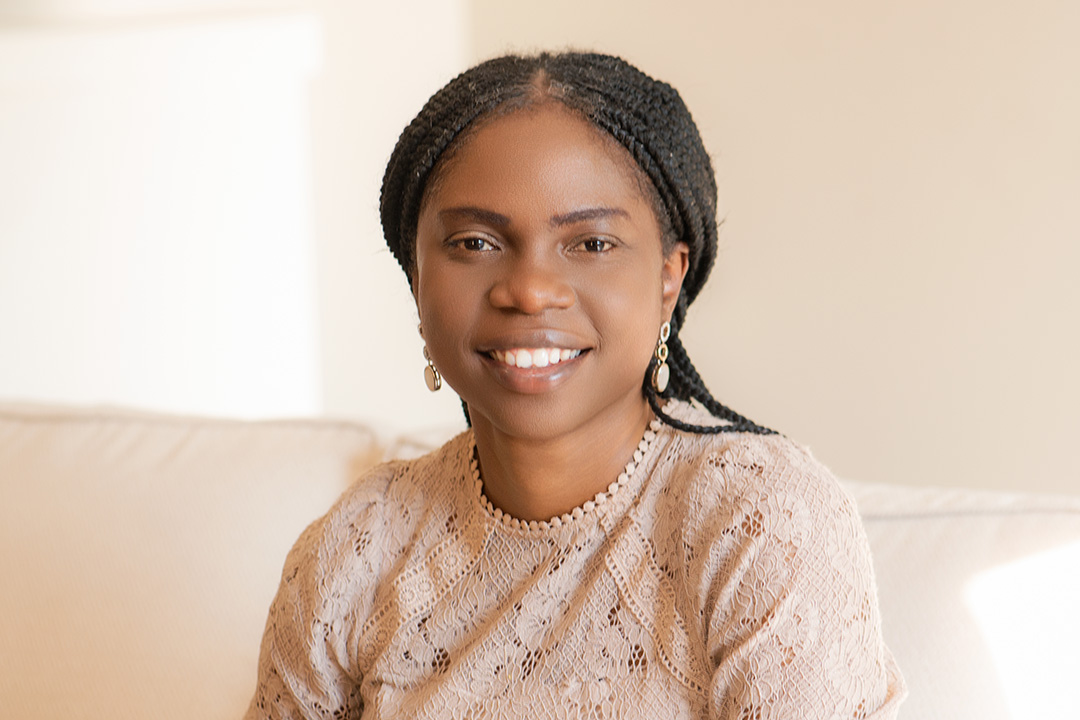
‘There’s no other place for me to be’: Neuroscientist joins veterinary college at USask
From a young age, Dr. Olamide Adebiyi (DVM, PhD) has loved animals and teaching — two interests that eventually led to her career in veterinary medicine and academia.
By Rigel SmithGrowing up in Nigeria, Adebiyi says caring for and playing with her grandmother’s cat sparked her initial interest in animals.
“I just got excited about animals generally. Not just pets — even large animals.”
Teaching was another constant in her life.
"I've always known myself teaching," she reflects. “When we played pretend as kids, there was the mother, the father, the child — but for me, it’s always been the role of teacher.”
Despite her early passion for animals, Adebiyi found herself torn between a career in human and animal medicine. However, when she couldn’t secure a place in a human medicine program, she decided to revisit her “first love” — veterinary medicine.
This decision marked the beginning of an exciting trajectory, delving into her love of subjects such as anatomy and physiology. In 2007 she earned her Doctor of Veterinary Medicine (DVM) degree from Nigeria’s University of Ibadan. She then stayed on to complete her master’s program in veterinary pharmacology, followed by a PhD degree in veterinary physiology with a focus on neurophysiology.
After completing her doctoral studies in 2017, Adebiyi spent nearly a year as a visiting Fullbright Scholar at Cornell University’s College of Veterinary Medicine in Ithaca, N.Y., and more than two years as a postdoctoral research associate at Western University in London, Ont.
Now she’s preparing for the next step in her career: a move to the University of Saskatchewan (USask) and the Western College of Veterinary Medicine (WCVM). This summer, Adebiyi will join the Department of Veterinary Biomedical Sciences as an assistant professor of neuroscience, where she will continue her research activities and teach courses in the college’s DVM program.
Adebiyi says sharing her knowledge with others is something she’s always enjoyed. She plans to use a discussion-based approach and real-world case studies in her classes to enrich the learning process for her students.
“For you to be able to teach effectively, you have to use different methods to explain and make people love and enjoy what you’re teaching,” says Adebiyi. “At the end of the day, your learner should even be better than you as a teacher.”
Her research lab, Myelin in Neurodegenerative and Neurotoxic Disorders (MyNND), will serve as a hub for collaboration and a translational approach to her research on demyelination and cognition.
Myelin — or myelin sheaths — is the fatty substance that wraps around the axons in the brain to allow for fast communication between nerve fibres. Demyelination refers to the breakdown of this myelin between the nerve fibres, affecting the speed of communication in the brain. With time, the myelin continues to disintegrate and is replaced by scar tissue. This can cause numerous neurological symptoms such as vision loss and muscle weakness. As damage to the myelin continues, neurological symptoms worsen.
The most common demyelinating disease is multiple sclerosis (MS), a neurological disorder. Canada has one of the highest rates of MS globally, with Saskatchewan having among the highest rates in the country.
"The unfortunate thing is, as we speak now, there is still no cure for multiple sclerosis," says Adebiyi, who hopes her work will contribute to developing more effective treatments. “What we have now are drugs that will slow down the progression of the diseases, but with time, the symptoms worsen.”
Adebiyi says that demyelinating diseases such as MS disproportionately affect young, healthy individuals.
“Unlike Alzheimer’s [disease] where people think ‘Okay, I don’t have to worry until I get old,’ these diseases reduce the activity of young people,” says Adebiyi.
She adds that there’s still a long way to go before a cure is found.
“We are getting closer to a cure, but we are not there yet,” says Adebiyi. “I think my research will take us a step closer.”
She believes the best place to continue her research is at USask, which is home base to resources such as the Cameco MS Neuroscience Research Centre. As Adebiyi builds her new lab at the WCVM, she is actively seeking graduate students and postdoctoral fellows to be part of her exciting research group.
“This is a translational field of research and [USask] has all the top health faculties to collaborate with. I want to be a part of that team,” says Adebiyi.
“There’s no other place for me to be aside from the University of Saskatchewan.”
Contact Dr. Adebiyi (o.adebiyi@usask.ca) for more details about opportunities in her research lab.
Together, we will undertake the research the world needs. We invite you to join by supporting critical research at USask.
Article re-posted on .
View original article.

